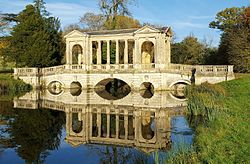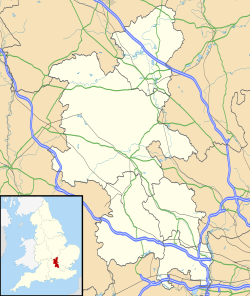| Stowe | |
|---|---|
 The Palladian Bridge | |
| Type | Landscaped garden |
| Location | Buckinghamshire, England |
| Coordinates | 52°01′48″N 01°00′54″W / 52.03000°N 1.01500°W |
| Website | Stowe |
| Official name | Stowe |
| Designated | 30 August 1987 |
| Reference no. | 1000198 |
Stowe Gardens, formerly Stowe Landscape Gardens, are extensive, Grade I listed gardens and parkland in Buckinghamshire, England. Largely created in the 18th century, the gardens at Stowe are arguably the most significant example of the English landscape garden. Designed by Charles Bridgeman, William Kent, and Capability Brown, the gardens changed from a baroque park to a natural landscape garden, commissioned by the estate's owners, in particular by Richard Temple, 1st Viscount Cobham, his nephew Richard Grenville-Temple, 2nd Earl Temple, and his nephew George Nugent-Temple-Grenville, 1st Marquess of Buckingham.
The gardens are notable for the scale, design, size and the number of monuments set across the landscape, as well as for the fact they have been a tourist attraction for over 300 years. Many of the monuments in the property have their own additional Grade I listing along with the park. These include: the Corinthian Arch, the Temple of Venus, the Palladian Bridge, the Gothic Temple, the Temple of Ancient Virtue, the Temple of British Worthies, the Temple of Concord and Victory, the Queen's Temple, Doric Arch, the Oxford Bridge, amongst others.
The gardens passed into the ownership of the National Trust in 1989, whilst Stowe House, the home of Stowe School, is under the care of the Stowe House Preservation Trust. The parkland surrounding the gardens is open 365 days a year.
